
Recently on Cyclingnews.com |
An interview with Oscar Sevilla, December 15, 2005
The rebirth of Oscar
Although results have been a little on the lean side the past few seasons, Oscar Sevilla is still one of the top Spanish riders in the pro peloton. His performances are always followed by plenty of fans eager to watch him climb the hardest stages, but after a serious back problem following the 2003 world's road race in Hamilton, Sevilla has spent much of the last two years on the mend. His training and racing has been disrupted, but he's confident he'll make a full recovery. In 2006, it's time for new beginnings; now a married man and with a new season on the horizon, Cyclingnews' Hernan Alvarez caught up with Sevilla at home after some demanding training in the Austrian Alps.
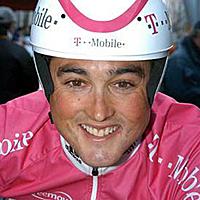
|
Cyclingnews: How was the 2005 season for you?
Oscar Sevilla: I've improved a lot from 2004 - after the crash at Hamilton world's [in 2003], 2004 wasn't as I would've liked it to be. 2005 has been better; this year I finished seventh in the Vuelta a España, I rode a good Tour de France for my team, but personally I think I can go for more. I believe I can return to 100 per cent fitness and become the type of rider I was.
CN: We saw you were there up the front with some big names on the mountainous stages of the Vuelta. You were seventh - you would've enjoyed a stage win, right?
OS: Yes, I lacked that win to finish the race as I'd have liked. But, as I tell you, I'm taking it little by little. I especially need to improve my pedaling. My left leg is weaker and I lacked that final sprint. In the Vuelta I found that motivation I needed to put myself up with the leaders in the mountains, but maybe I lacked a victory. I could have had a little more confidence too - like it or not, you lose confidence [when you're injured] and the Vuelta helped me to see that I am at the front and that I'm able to stay there. I know what I've been through, and I believe and hope when I'm fully recovered I can fight for the top places.
CN: Do you think your team helped you with your personal ambitions in the Vuelta or do you think you lacked support from T-Mobile?
OS: Maybe I was alone in some parts of the race, but I have nothing to complain about. I think my teammates gave it their all. The problem is that in the first ProTour year, T-Mobile rode many races and it's normal that people arrive at a race with a little less strength. Later in the race, the heat punished the riders a lot - I think we'll plan differently next year and I hope to have more support in the Vuelta. But like I said, the team was great - they gave their all to help me. When they could, they were with me and they did it wonderfully.
CN: For T-Mobile, the Vuelta wasn't so good considering Erik Zabel didn't win a stage. You and Zabel were the two big names, but neither of you managed a stage win. What do you think about that?
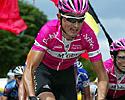
|
OS: Yes, it's true we couldn't get a victory but Erik won Paris-Tours later in the season. In the Vuelta a España he couldn't win but he's still a champion; of course he's lost a little bit of his speed. Petacchi is a younger rider and a winner, and it's noticeable. We couldn't win a stage but we tried our best - the team fought hard, and like I said before, they reached the end of the season a little worse for wear and it showed.
CN: Alexandre Vinokourov and Zabel are leaving the team next season. Is this an advantage to you inside the team?
OS: Yes, I think so. Two winning riders leaving is better to a rider like me because it means I have more freedom in some races. But I think the best thing for me is to fully recover from my injuries which I haven't quite done yet - I know that I can get some good results, which I hope happens soon. I don't need to wait for other riders to leave, and I don't need to demonstrate anything to anybody but myself. I know how I am. I feel much better than when I was second in the Vuelta a España and seventh in the Tour [in 2001]. I have more experience, I'm stronger, but that damn fall [at Hamilton World's] has spoiled my career a bit. I hope I can forget about it little by little and I can perform as I should, train as I should, and do things as they should be done.
CN: Perhaps you need a stage victory in some big race...
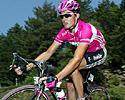
|
OS: My dream is to get on the podium at the Tour and to win the Vuelta a España, which I can win. But also to win a mythical stage in the Tour or the Vuelta. A stage where media would say: "Sevilla wins at the summit" or something like that. I hope I can achieve that before my retirement and I hope I can do it soon. It would be great for me. I think I deserve it and the fans also deserve it because they are always there and they've helped me a lot. Everywhere I go, I have people's support and this is very good for a sportsman because sometimes you have difficult times; the affection of people has been very important for me.
CN: How do you see Andreas Klöden and Jan Ullrich for next year?
OS: Ullrich always looks very good. Physically he's a very strong guy, a rider who won the Tour, who finished second in the Tour five times, and the truth is that he's a rider who can win the Tour. I hope he can win the Tour in 2006. I think he's more mature, especially in mental terms. He no longer starts the season overweight and I think he has more focus right now; he is more stable. I see him very united with his new girlfriend - I think he's happy and that counts. I think he knows he has a very good opportunity to win the 2006 Tour and I hope he doesn't waste it. I hope he can win for the good of the whole team.
And Klöden has had bad luck after suffering a crash this year. Maybe he wasn't at the level he was in 2004, but he was doing fine and had to quit because of that crash. He didn't race anymore this year and we'll see how things go in 2006. I think he's an uncertainty; I think he's a good rider but I see Ullrich with more confidence.
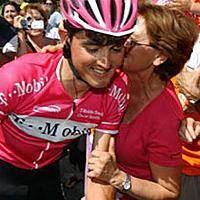
|
CN: There was a training camp in the Austrian Alps several days ago. You spent some time in the mountainous Montafon region, in Voralberg.
OS: Yes, I got back to my town [Ossa de Montiel] yesterday. Firstly, I got married on November 5 and we went to Puerto Rico for the honeymoon. I loved it, especially the weather. Then I came back to Europe and I was in Munich two days with the team doing effort tests, plus team pictures, receiving new team clothing, etc. Then we went to the mountains in Austria for three days.
That was nice. We were together with the sporting directors for three days in a mountain shelter at an altitude of 2000 metres. We walked up there because it wasn't possible to reach the place by car, and we lived as a group, we played games, we did some fun things in the snow. I think it was a wise move; get together, make friends and unite the team group. I think it was very positive, very fun. We also played the usual jokes on new riders.
CN: Do you have some riders you get along with better inside the team?
OS: Honestly, I get along well with everyone. I'm a friendly person and maybe Vinokourov's exit hurt me. He is a very good rider and I developed a good relationship with him. Nowadays I maintain good relations with [Daniele] Nardello and [Giuseppe] Guerini - the Italian riders - because of the language. Other riders who I'm friends with are [Lorenzo] Bernucci and Eric [Baumann], and of course Jan [Ullrich]. He [Ullrich] is a very simple, normal guy. There's a good environment in the team - the directors are very cheerful, guys like Frans van Looy and Mario [Kummer] are great; there's a very good group.
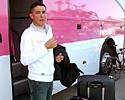
|
CN: You were part of Phonak, and have now spent a season with T-Mobile. How do you manage to communicate with the other people, especially the technical instructions?
OS: We understand each other in Italian most of the time. There are 15 riders who speak Italian. With the rest, in English as I can. We did an English course at the training camp and from next year on, we'll talk in English. They gave each of us a teacher at home and now we have to study in order to improve our communication skills. All the directors speak Italian, and if we can't speak in English at first, we speak in Italian. I hope we can learn English.
CN: What about German?
OS: German is too complicated [laughs]... in the team, they told us that English is better because it's easier for everyone and more neutral.
CN: What is your opinion about the ProTour's first season?
OS: I saw it as a good thing but it needs to be corrected in a few small ways. It has some errors; it's a new thing and maybe it should be improved in some aspects. I saw good things; the races were run at a great level, but on the other hand, there are some things that don't fit it with the ideas of the ProTour. Maybe there are sponsors that want to get involved with cycling but there are some barriers so they stop their sponsorship and look for another advertising choice.
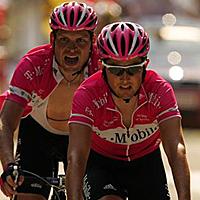
|
There are also things that happened in the Vuelta a España or other races, like Spanish teams Kaiku or Andalucia wanting to ride the Vuelta but not being allowed to do so. On the other hand, there were teams like Credit Agricole and Française des Jeux that were forced to race the Vuelta even though they didn't want to take part in it. I think they should look for a way that means this doesn't happen and where everyone wins. A way that's beneficial for the team that wants to race and also beneficial for the team that doesn't want to ride where they can rest their riders for other races.
The television matter is another topic. Everybody thought the races were going to have more television coverage and it was the opposite. Maybe there were good races that weren't broadcasted as they should have been. I think an alternative should be explored to ensure more television coverage, therefore attracting people to the sport - that'd be very good for sponsors and for the cyclists.
CN: The current elite system can't please every part of international cycling in the same way, and it's complicated to reach an agreement with everyone. Countries such as France, Italy and Spain have a position in the ProTour which differs from countries like Poland and Switzerland, who have less cycling tradition. Do you think this is the case?
OS: Yes - it's difficult to make something that's good for all parties. I think the most complicated thing was the ProTour's launch, which has taken place already. Now I think there needs to be intelligent and neutral people looking out for everyone's benefit. It's certain you will never find the ideal point for everyone but the point that's close to being fairest.
CN: What are your plans for the coming months?
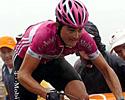
|
OS: I've begun training a little bit now. I arrived at home, I spent two holiday months without doing anything. I gained some weight, I recovered well and I have the "batteries charged". Now I've also begun doing some gym work, some trekking in the woods, some running, some mountain biking. And the most important thing - to finish solving my back problem. I'll travel to Germany with the team doctor to do 15 days of strong physiotherapy and see if we can fix this injury. I hope to recover well and wait for 2006 with the sensation that I don't have anything wrong, with my head clear and willing to suffer just on the bicycle.
I had many problems and they [the doctors] didn't tell me exactly what they were. I had a vertebra fracture when I fell at world's and all my problems were because of that. I really have a good time over the bike because I love it - it's my passion, but I would like to enjoy it a bit more, without any problems.
CN: Your plan is to ride the Tour de France and the Vuelta a España, right?
OS: Yes, the Tour and Vuelta. My calendar would start in Andalusia, in the Ruta del Sol, riding in a good place. I have many friends there; I have a house in Granada. It's a race that I like and the organieer is a friend of mine - he likes the fact that I take part in the race. So we will begin there. Later on, I'll ride the Settimana Ciclistica Internazionale with Jan.
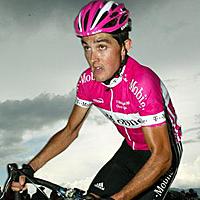
|
Then, I will race the Vuelta al Pais Vasco; that's a race I like. There's some cold when it rains or snows, but it's nice. In the Basque Country, there are excellent fans and they have true cycling knowledge. It's great the way they cheer the first to the last rider, and they take into account the effort you make. Later on, I will do the Tour de Romandie - that is another race that I like a lot which has given me a lot in my sporting career. I will then ride the Volta a Catalunya or another race around there. It's certain that the Dauphine Libere will be the last race I do before the Tour de France. After the Tour, I have no idea. First, we think of the Tour and then of the Vuelta. The Tour is the main thing for the team, and we'll be giving it our all, something we're preparing for already.
CN: Finally there will be a new champion after seven years...
OS: I think it will be good for cycling because people can watch a more open race with less control, which is more attractive. Now we'll see what the directors are made of because they are the ones who'll make all the decisions on the race. I'm against the earphone for riders because the race becomes too controlled; they [the directors] handle it too much and I don't like it. Let's see how they order us, how they move us.
CN: I suppose that with the retirement of Armstrong, the 'king of kings', you guys will be able to express yourselves more.
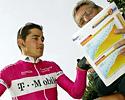
|
OS: I've discussed that with many people. In the past we did what Discovery [or US Postal] wanted us to do. They rode the race as they pleased - fast, slow, very fast and I think this will be left behind. I think the race will be different and we won't have an obstacle like Lance Armstrong; he was the reference point for everyone. You knew he was the strongest and it bothers you and you were left without much confidence. I think now everything will be different. There won't be a rider as solid as Armstrong who controls everything. There will be [Ivan] Basso, [Alejandro] Valverde, Jan in the lead. I think there will be many attacks, many breakaways and I think it will be spectacular. Besides, they made a very nice parcours with many mountains. It will be like the Vuelta a España, with many attacks and breakaways; it'll certainly have some surprises.
